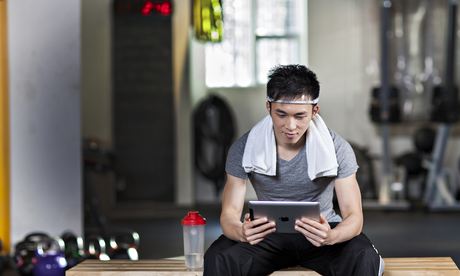
As innovation in medical tech accelerates – as do concerns around a growing ageing population and a rise in chronic diseases – the healthcare sector is ripe for disruption. Increasingly, aspects of health and wellbeing are being handed back to the people via technology – and the latest spate of product launches signify a movement that is looking beyond fitness to more holistic health and wellness. As I see it, technology and wellbeing are colliding to radically shift the healthcare "paradigm".
Wearable tech: is a healthcare handover the next phase?
The most exciting new tech places responsibility for health management directly into the hands of the people. Literally. Wello from Azoi is a smartphone case featuring sensors to measure a user's vitals including blood pressure, electrocardiogram (ECG), heart rate, blood oxygen, lung function and temperature. It's indicative of a movement that encourages prevention rather than cure, through improved self-awareness of our own health. If it takes off, imagine the potential impact on health, wellbeing and in easing pressure off healthcare services.
Data = knowledge = empowerment
Wearable health tech dominated both CES and SXSW this year, but glancing further into the future we see MIT's Empathic Threads leading the way to a literally more interwoven approach to health management via mindblowing bioengineering advances. This tech can actually be sewn within clothing to offer feedback on pulse, pheromones and other essential biorhythmic data.
We're moving towards tech that takes a holistic approach to wellbeing in the truest sense of the word, encompassing mind, body, even soul. Muse headbands, for instance, use emotion detection tech that measures brainwaves to predict and detect moods. With consumers largely blind to most interruptive messaging, here lies one potential way of reaching people just they are most receptive and warm to it.
Health tech also promises to empower us as a global community with advanced insights into patterns of data. Kinsa's thermometer connects to an iPhone, enabling users to store the recorded temperature. Interesting here is the software's potential to track community patterns, with the ambition of revealing useful trends. Standing in a marketer's shoes, how about bundling this tech with baby brands for new parents, for instance, by linking with infant cold medicines in relevant locations?
Brands enter the conversation
Real-time health measurement is another hot issue, with great potential for empowered consumers to measure, monitor and improve their health. Neumitra's wrist-worn sensor measures stress in real-time via the skin and pulse. Overlay this data on a calendar to determine which specific events (traffic jams, meetings, even family dinners!) cause you the most stress. I see obvious tie-ups here from brands that could provide wellbeing advice to help people manage stress levels.
We're already seeing non-health or pharma brands beginning to ride the wave of an upcoming consumer health handover. Apple is hiring physiologists. Nestlé is focusing less on its confectionary and cosmetics and more towards its healthcare brands; Sanofi is running big-money hackathons; and Google is speculating on contact lens technology for diabetics. The stakes are high and the game is fast: both tech giants and crowdfunded startups can ship wearable step count, heart-rate, blood-glucose and newer health status monitors in under 12 months.
Privacy and the ultimate value exchange
While having personal health data at our fingertips is alluring and empowering – it also sparks important biohacking and privacy debates. What are the implications of brand tie-ups and CPGs having access to our biometric records? Would you give your medical data to your insurer? Your employer? What about your blood or DNA sequence?
I've had my DNA sequenced with 23andme (the Google-backed, banned-in-the-US genome information provider). It provides powerful information about my physiology and heritage and generates fun spin off ideas – it would make for the ultimate dating site compatibility test! But interested as I am in my genetics, at what point would I allow this intimate information to be available to marketers in exchange for the ultimate in bespoke products and services?
In the end it's still about a "value exchange". How much information are we willing to hand over to marketers in order to receive better services? And how much health management can we take on ourselves with these new technologies?
Tom Kelshaw is director of technology at media agency Maxus' R&D unit
Get more articles like this sent direct to your inbox by signing up for free membership to the Guardian Media Network – this content is brought to you by Guardian Professional.

